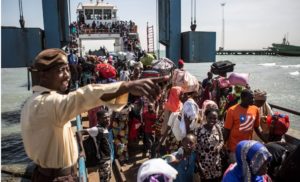Lessons from Gambia
It could prove to be a seminal moment in the history of African democracy and development.
Last month Gambia’s disgraced president Yahya Jammeh boarded a private jet and headed for exile in Equatorial Guinea.
He is said to have taken with him $50 million as well as the jet and a fleet of luxury cars bought with the state’s pension fund. He is also said to have left his impoverished nation $US1 billion in debt.
 Since Jammeh’s departure, Gambians who fled the country under his brutal rule have been flooding back into the country.
Since Jammeh’s departure, Gambians who fled the country under his brutal rule have been flooding back into the country.
These events mark important moment in the history of Africa, a continent whose people have often suffered under ruthless despots – and before that at the hands of brutal colonial masters.
Jammeh and a group of other young army officers came to power in a coup in 1994. After 22 years of oppressive rule, in which arbitrary detention, torture, and disappearances were commonplace, he suffered a shock electoral defeat in a poll late last year that most observers expected him to rig.
At first, Jammeh magnanimously accepted the result but changed his mind a week later and declared the poll void.
He petitioned the Supreme Court for a fresh election, but having sacked most of the judges 18 months previously the court could not hear his challenge before May.
Jammeh then declared a state of emergency that technically would have allowed him to stay in power for another three months.
To their credit, other West African leaders ignored his desperate, last-ditch attempt to cling to power and began working to resolve the crisis.
They formed an intervention force under the aegis of the Economic Community of West African States (ECOWAS) and backed the winner of the election Adama Barrow.
But even then, Barrow had to be sworn in as President in Dakar, Senegal, to ensure his safety.
The threat of force was crucial in buttressing mediation efforts by ECOWAS that eventually succeeded in pressuring Jammeh to accept his electoral defeat and step down.
ECOWAS troops and military vehicles now patrol the streets of Banjul and Gambian soldiers are being disarmed because of a concern that rogue elements, still loyal to Jammeh, could cause trouble.
Barrow’s inauguration speech embraced the history-making moment.
“This is a day no Gambian will ever forget,” he said. “The capacity to effect change through the ballot box has proven that power belongs to the people in The Gambia. Violent change is banished forever from the political life of our country. All Gambians are therefore winners.”
One of the new administration’s first tasks will be to support the return of the 46,000 refugees estimated by the UN’s refugee agency, UNHCR, to have fled to Senegal and Guinea over the past weeks, fearing impending conflict.
An estimated 25,000 have also been internally displaced, according to the Gambian Red Cross Society. Almost everyone in the capital sent family members – mainly women, children, and the elderly – away to the sanctuary of relatives in other parts of the country.
Extra pressure is being placed on already stretched food supplies and sanitation in the some of The Gambia’s poorest communities. And the nation’s main source of income, tourism, may take a while to recover.
Laurie Nowell
AMES Australia Senior Journalist












